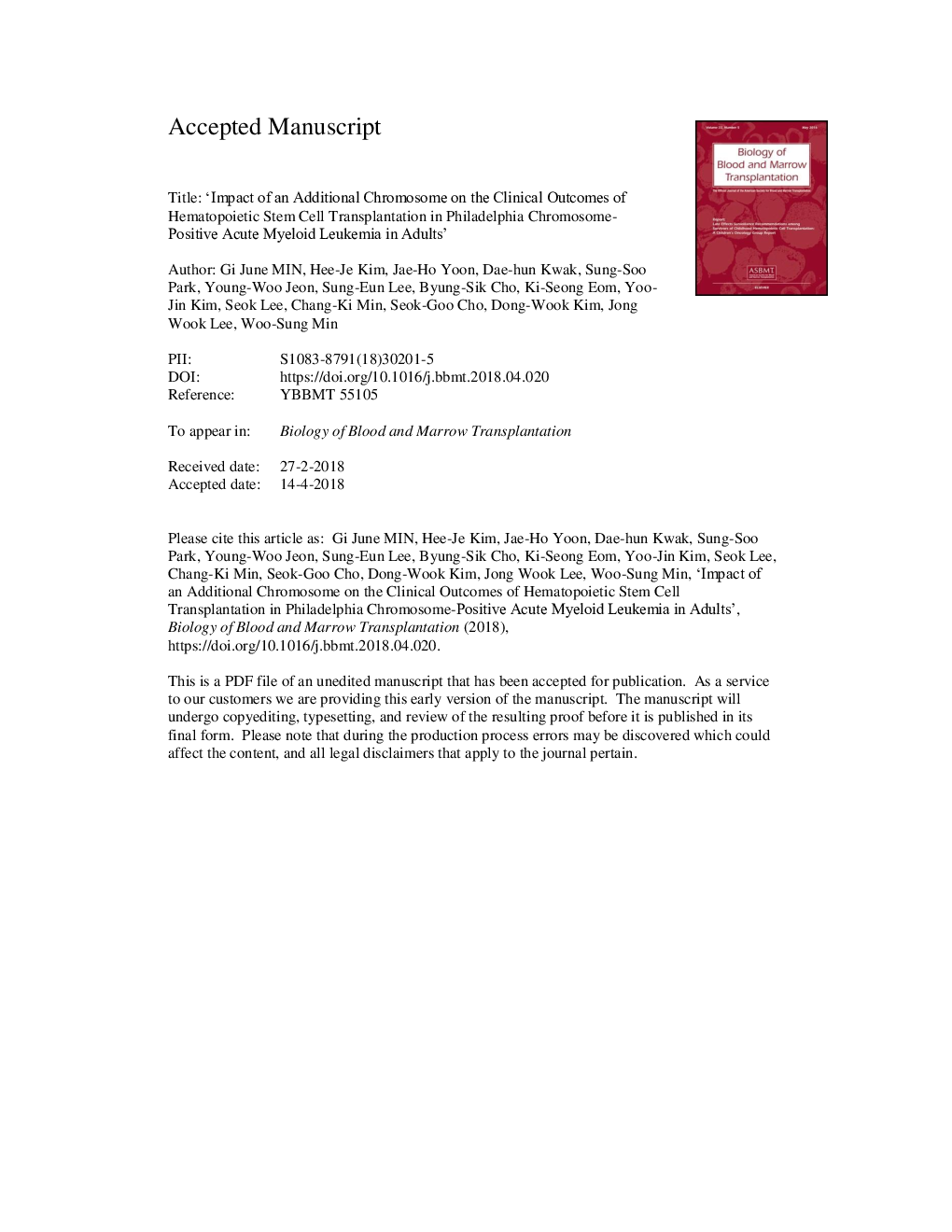| کد مقاله | کد نشریه | سال انتشار | مقاله انگلیسی | نسخه تمام متن |
|---|---|---|---|---|
| 8949649 | 1645721 | 2018 | 25 صفحه PDF | دانلود رایگان |
عنوان انگلیسی مقاله ISI
Impact of an Additional Chromosome on the Clinical Outcomes of Hematopoietic Stem Cell Transplantation in Philadelphia Chromosome-Positive Acute Myeloid Leukemia in Adults
ترجمه فارسی عنوان
تاثیر یک کروموزوم اضافی بر نتایج بالینی پیوند سلول های بنیادی هماتوپوئیدی در لوسمی میلوئید حاد مثبت کروموزوم مثبت در فیلادلفیا در بزرگسالان
دانلود مقاله + سفارش ترجمه
دانلود مقاله ISI انگلیسی
رایگان برای ایرانیان
کلمات کلیدی
موضوعات مرتبط
علوم زیستی و بیوفناوری
بیوشیمی، ژنتیک و زیست شناسی مولکولی
تحقیقات سرطان
چکیده انگلیسی
The incidence of Philadelphia chromosome positivity (Ph+) in adults with acute myeloid leukemia (AML) is very low. Ph+ AML is considered to be high risk for failure to attain remission or for early relapse after standard chemotherapy. Because of the low incidence of the disease, it has been difficult to determine the best treatment, including the effects of tyrosine kinase inhibitors. We retrospectively analyzed 29 patients with Ph+ AML (median age, 45 years; range, 18 to 80) managed at our center between 2002 and 2016. Two patients were not treated at all, 3 received repeated low-dose cytarabine, and 24 were treated with 3â+â7 standard induction chemotherapy. All 27 treated patients also received interim imatinib 400âmg orally until the day of the next chemotherapy cycle began or as conditioning for allogeneic hematopoietic cell transplantation (HCT), which was performed in 17 patients. Of the 29 patients with Ph+ AML, 7 (24.1%) had additional inv(16), 3 of whom had therapy-related AML. In the 7 with inv(16), the median age was younger (31 versus 44 years, Pâ=â.083) and the complete remission (CR) rate was relatively higher (85.7% versus 54.5%, Pâ=â.214) than in those without inv(16). Among the 27 treated patients, 20 (74.1%) achieved CR after standard chemotherapy with interim imatinib and 2 (7.4%) achieved CR after low-dose cytarabine with interim imatinib. After a median follow-up of 65.5 months (range, 13.4 to 156.6), the 5-year overall survival (OS) among all 27 treated patients was 43.1%. For the 17 patients who underwent HCT the 5-year OS of 17 patients (10 in subgroup without inv(16) and 7 in subgroup with inv(16)) treated with allogeneic HCT was 69.3%. All 7 with inv(16) were still alive at the end of the study. In contrast, all patients not treated with HCT died within a median of 6.25 months (range, .2 to 18.2). Interim imatinib combined with chemotherapy yielded an acceptable remission rate in adult patients with Ph+ AML. Allogeneic HCT as a postremission therapy provided long-term disease control in two-thirds of those who underwent the transplant. We also demonstrated that inv(16) was related to a favorable outcome in Ph+ AML, including therapy-related AML.
ناشر
Database: Elsevier - ScienceDirect (ساینس دایرکت)
Journal: Biology of Blood and Marrow Transplantation - Volume 24, Issue 8, August 2018, Pages 1621-1628
Journal: Biology of Blood and Marrow Transplantation - Volume 24, Issue 8, August 2018, Pages 1621-1628
نویسندگان
Gi June Min, Hee-Je Kim, Jae-Ho Yoon, Dae-hun Kwak, Sung-Soo Park, Young-Woo Jeon, Sung-Eun Lee, Byung-Sik Cho, Ki-Seong Eom, Yoo-Jin Kim, Seok Lee, Chang-Ki Min, Seok-Goo Cho, Dong-Wook Kim, Jong Wook Lee, Woo-Sung Min,
